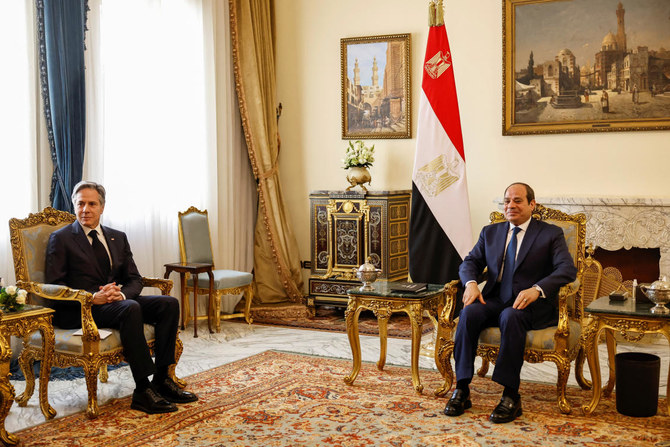CAIRO: US Secretary of State Antony Blinken discussed efforts to de-escalate tensions between Israel and Palestine in talks with Egyptian President Abdel Fattah El-Sisi on Monday at Al-Ittihadiya Palace.
The two exchanged views on a number of international and regional issues of common interest, including the latest developments in the Palestinian territories and the joint efforts to contain recent escalating tensions.
The talks took place on the second day of Blinken’s visit to Cairo, part of a larger Middle East tour the US secretary of state is currently undertaking.
A spokesman for the Egyptian president stated that El-Sisi stressed the importance of the strategic partnership between Egypt and the US and expressed hopes to enhance coordination on various political and security matters.
Blinken emphasized that Washington is counting on close coordination with Egypt to restore stability between Palestine and Israel.
President El-Sisi likewise highlighted the importance of working to de-escalate tensions in the region and limit any unilateral measures taken by either party.
He affirmed Egypt’s desire to reach a just and comprehensive solution that guarantees the rights of the Palestinian people in accordance with international frameworks and in a way that achieves lasting peace and stability.
During the meeting, the issue of the Grand Ethiopian Renaissance Dam was also discussed.
El-Sisi stressed the need to reach a binding legal agreement to fill and operate the dam in a way that achieves common interests and preserves the water rights of all parties, highlighting the importance of the US in playing an effective role in resolving this crisis.
Blinken wrote on his Twitter account: “Important meeting with President Abdel Fattah El-Sisi on the US-Egypt strategic partnership.
“We discussed Egypt’s important role in regional stability, bilateral cooperation, and the importance of progress on human rights,” he added.
Blinken also held talks on Monday with Egyptian Foreign Minister Sameh Shoukry at the Ministry of Foreign Affairs headquarters in Cairo. The two discussed issues related to Palestine, the GERD, Libya and Sudan.
The secretary of state said that the US supports Sudan’s transition to democracy and that the future of the country is dependent on the existence of a government that considers the interests of all segments of the population. Concerning Libya, he stressed the importance of holding elections this year, emphasizing the right of the Libyan people to choose their leadership.
Regarding the GERD, Blinken said: “We have heard from the Egyptian leadership that it is an existential matter for Egypt, and we support any solution that takes into account the interests of all parties.”
As for current tensions between Israel and Palestine, Blinken acknowledged that the present time is characterized by difficulty in light of the recent escalation of violence and said that he wants to hear from all sides during his visit to the West Bank and Israel.
During a joint press conference with the US secretary of state, Shoukry said the talks that were held “clearly reflected the broad convergence of strategic interests between the two countries and the great consistency in visions on many issues, and also showed the enormous potential for developing strategic partnership in many fields.”
Shoukry praised the friendly relations between Egypt and the US and expressed Egypt’s desire to strengthen the relationship on the basis of mutual respect and shared interests.
Blinken said that Egypt and the US are fully committed to developing and deepening bilateral relations.
He added: “We have supported a contract worth $600 million to build an underwater communications cable to deliver approved fast communications, and we are also helping Egypt invest in the field of wind and solar energy, and we are trying to move forward in joint economic cooperation in order to build on these relations.”
Blinken affirmed that relations between the two peoples are one of the pillars of the partnership between the US and Egypt.
His remarks came during a meeting with students at the American University in Cairo in Tahrir Square.
Speaking at the campus, Blinken said: “It’s really wonderful to be here in this truly historic institution that has brought Egyptians and Americans together for so many years.”
Blinken acknowledged the importance of the youth in advancing both countries’ common goals and achieving economic empowerment and climate action.
The secretary of state said that he chose Egypt as the start of his tour in the Middle East because of the strategic partnership between the US and Egypt.
He said: “As we’re looking at the partnership between the US and Egypt, the strategic partnership that is of great consequence to the US, we know that going forward (this) partnership ultimately is going to be built and sustained and strengthened by the people here today and the people that you represent.
“Sixty percent of the population in Egypt is, of course, 25 years old or younger. So, this is an incredibly dynamic and youthful place.
“It’s important for us not just to engage government to government, as important as that is, but to engage with every sector of society, and again, especially the rising generation of Egyptians because, quite literally, you will be the ones making this country and you will be the ones who are carrying forward the relationship with the US.”
Blinken added: “We want to know what’s on your minds, what you’re thinking about, what you’re concerned about, and how you’re looking at things because, for me, the most important thing is this: Just because we’ve done something one way for the last 50 years doesn’t mean we need to do it the same way for the next 50 years.”
















